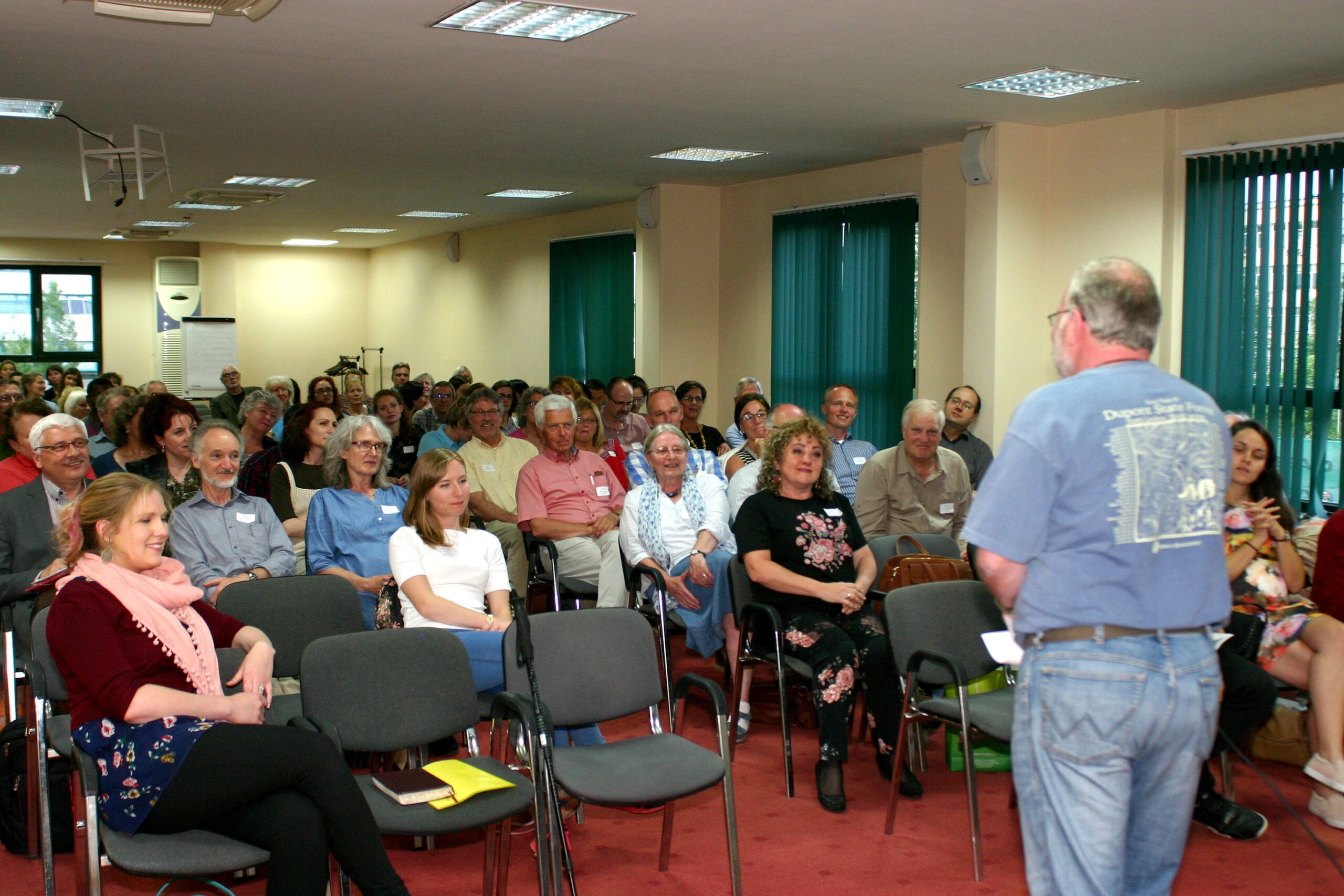Plenaries 1 & 3
How you can stay healthy despite high stress: Salutogenesis for Educators
Aaron Antonovsky, a Jewish psychiatrist, conducted studies with women born between 1914 and 1923 in Central Europe. Some of them were concentration camp survivors. Something struck him: 1/3 of the formerly interned women were in good mental health, despite the extreme stressors they were exposed to during their lives. Until now, researchers have asked themselves: What makes people sick? But now he asked a new question that is also crucial for us today: What keeps people healthy in the face of a high number of stressors? This gave rise to the concept of salutogenesis.
In the field of education, many factors will impact educational professionals in the next few years that will cause stress. If we just look at the amount of work, the number of students, the different performance levels, staff shortages and other general conditions in education. If we don’t want to slide into burnout one after the other, but rather fulfill God’s mission to the next generation, we have to prepare ourselves.
Since we are finding more and more traumatized children and young people in our facilities, the lecture is supplemented by the input of the educational specialist Theresa Thiel. She shows how to deal with trauma in the classroom or daycare. There are methods and approaches that do justice to these children and protect the groups, children and you yourself from being overwhelmed.
If everything gets better in the area of education, great! If not, do something good for yourself and prepare yourself to stay healthy despite stress.
Birgit Bergmann
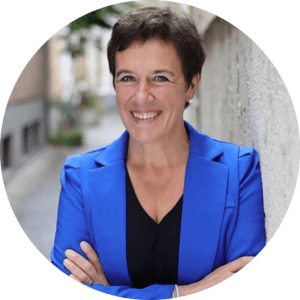
Birgit Bergmann is a systemic therapist and coach with a number of qualifications and specialties. She earned her diploma as a Social Pedagogue (FH) in Freiburg in 1987. She furthered her education, undertaking training as a Systemic Individual, Couple, and Family Therapist (DGSF), and later pursued an education as a Systemic Supervisor/Coach (DGSF).
She has worked in various roles in social pedagogy, including work in childcare facilities, a university children’s clinic, a women’s convalescent home, and roles in social pedagogical family assistance and school social work. Freelancing in her private practice as a family therapist, trainer, and coach, she ventured into an international and interdisciplinary Master’s program in Business Psychology at the University of Bremen. In 2012, she founded the Leadership Academy for Sustainability and Health in Bremen.
Since 2014 she has been advising, coaching, and teaching companies, teams, and individuals as an independent business consultant. Bergmann served as a member of the Bremische Bürgerschaft (Bremen Parliament) from 2015 to 2023.
Plenary 2
Building Resilience in Our School Community
Laci Demeter
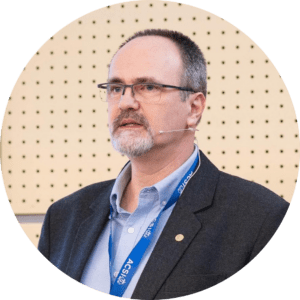 Laci Demeter is the European Regional Director of the Association of Christian Schools International. He began his journey as an educator by teaching English and engineering subjects at a vocational high school in Budapest. He began working with ACSI in 1995, recognizing the value of the Christian schools as a mission field in Europe. He assumed the position of Regional Director in 2011. Through the ministry of ACSI Europe, Demeter aims to equip school leaders, teachers, and students both academically and spiritually, enabling them to realize their potential as they serve in their respective capacities within their communities.
Laci Demeter is the European Regional Director of the Association of Christian Schools International. He began his journey as an educator by teaching English and engineering subjects at a vocational high school in Budapest. He began working with ACSI in 1995, recognizing the value of the Christian schools as a mission field in Europe. He assumed the position of Regional Director in 2011. Through the ministry of ACSI Europe, Demeter aims to equip school leaders, teachers, and students both academically and spiritually, enabling them to realize their potential as they serve in their respective capacities within their communities.
Plenary 4
Character and moral resilience
In the words of Comenius, a morally resilient individual knows what is good, wants what is good, and does what is good, even when no one is looking. This lecture will compare Comenius’ missional mentality versus victim mentality and their implications for moral resilience. The missional mentality presupposes a developed moral character, so this is the key question, ‘How is character developed and educated?’
Prof. Jan Hábl
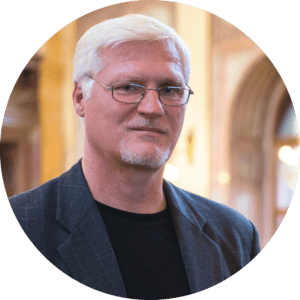 Jan Hábl is a professor of pedagogy at the University of Hradec Králové and serves as a pastor in Církev bratrská (Free Evangelical Church). His expertise lies in the philosophy of education, with a special focus on character education and the works of Jan Amos Comenius. He has actively engaged in training educators in collaboration with the Centre for Ethics and Character Development (cerc.cz) and Ethics and Character Education (evops.cz). Additionally, he has authored numerous books and articles, including Even if No One Is Looking: Foundational Questions of Ethical Education (Wipf & Stock, 2018), On Being Human(e) (Wipf & Stock, 2017), and Character Formation: A Forgotten Theme of Comenius’s Didactics (2011).
Jan Hábl is a professor of pedagogy at the University of Hradec Králové and serves as a pastor in Církev bratrská (Free Evangelical Church). His expertise lies in the philosophy of education, with a special focus on character education and the works of Jan Amos Comenius. He has actively engaged in training educators in collaboration with the Centre for Ethics and Character Development (cerc.cz) and Ethics and Character Education (evops.cz). Additionally, he has authored numerous books and articles, including Even if No One Is Looking: Foundational Questions of Ethical Education (Wipf & Stock, 2018), On Being Human(e) (Wipf & Stock, 2017), and Character Formation: A Forgotten Theme of Comenius’s Didactics (2011).
Plenary 5
Challenges Facing the New Generation
Piekarska will speak about the changing culture among Generation Alpha and how it influences the choices they make and their ability to face challenges. As teachers, parents, & mentors, we cannot be blind to these factors. Piekarska will focus specifically on the impact of technology & the internet on the mental health of Gen Alpha.
Agnieszka Piekarska
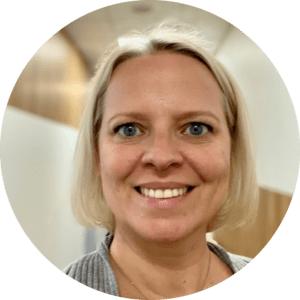 Agnieszka Piekarska graduated from Warsaw University with an MA in German and from Collegium Humanum with an MA in Psychology and Solution-Focused Brief Therapy. She worked as a pedagogue and a German teacher in elementary and middle school for 13 years. Since 2020, she has been a counselor and therapist at the Tomy Christian Counseling Center, working with students, adults, and parents. She has been involved with Proem Ministries, a Polish Christian organization, since 1992.
Agnieszka Piekarska graduated from Warsaw University with an MA in German and from Collegium Humanum with an MA in Psychology and Solution-Focused Brief Therapy. She worked as a pedagogue and a German teacher in elementary and middle school for 13 years. Since 2020, she has been a counselor and therapist at the Tomy Christian Counseling Center, working with students, adults, and parents. She has been involved with Proem Ministries, a Polish Christian organization, since 1992.

